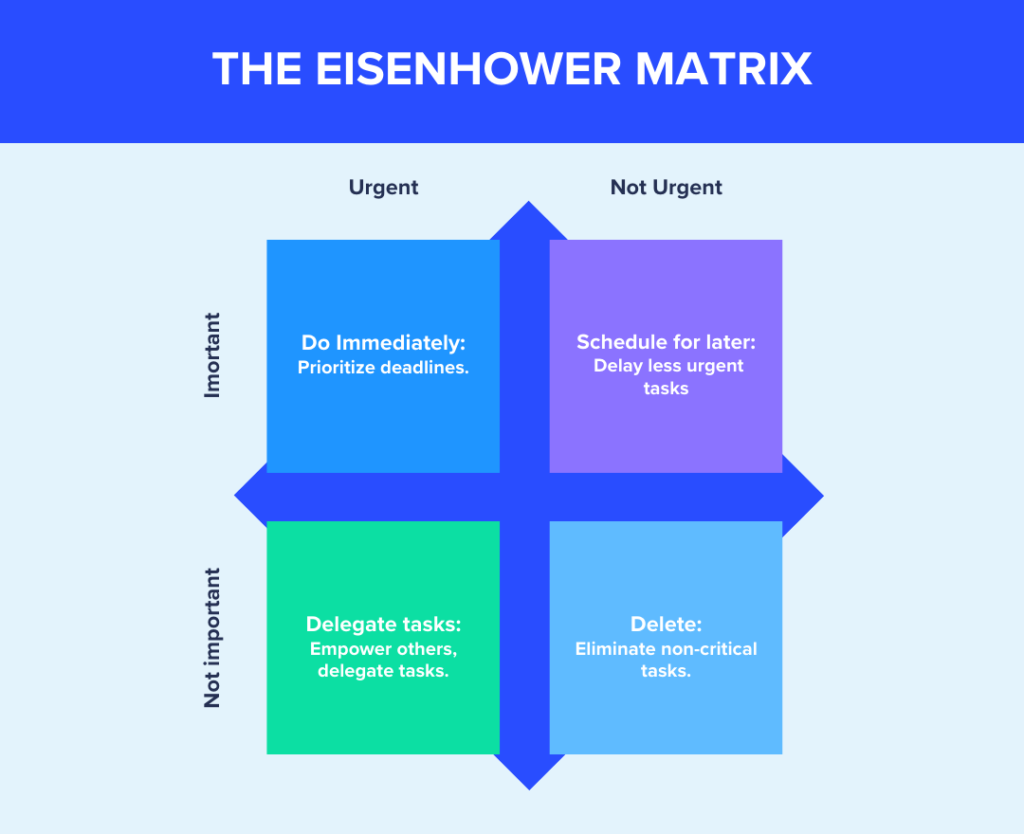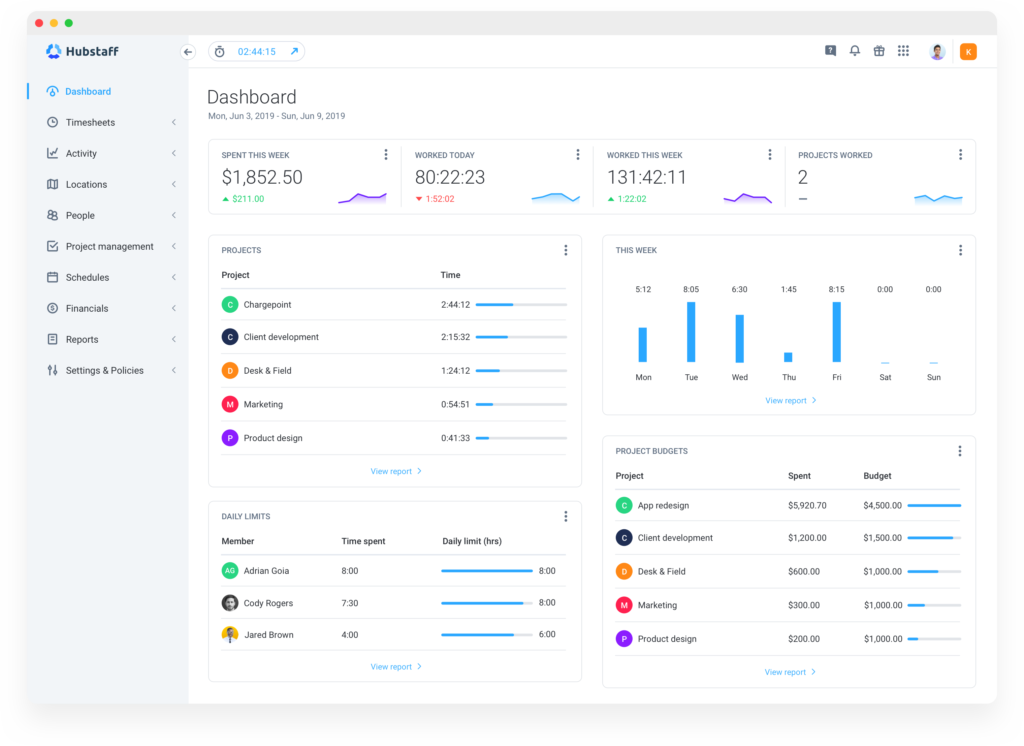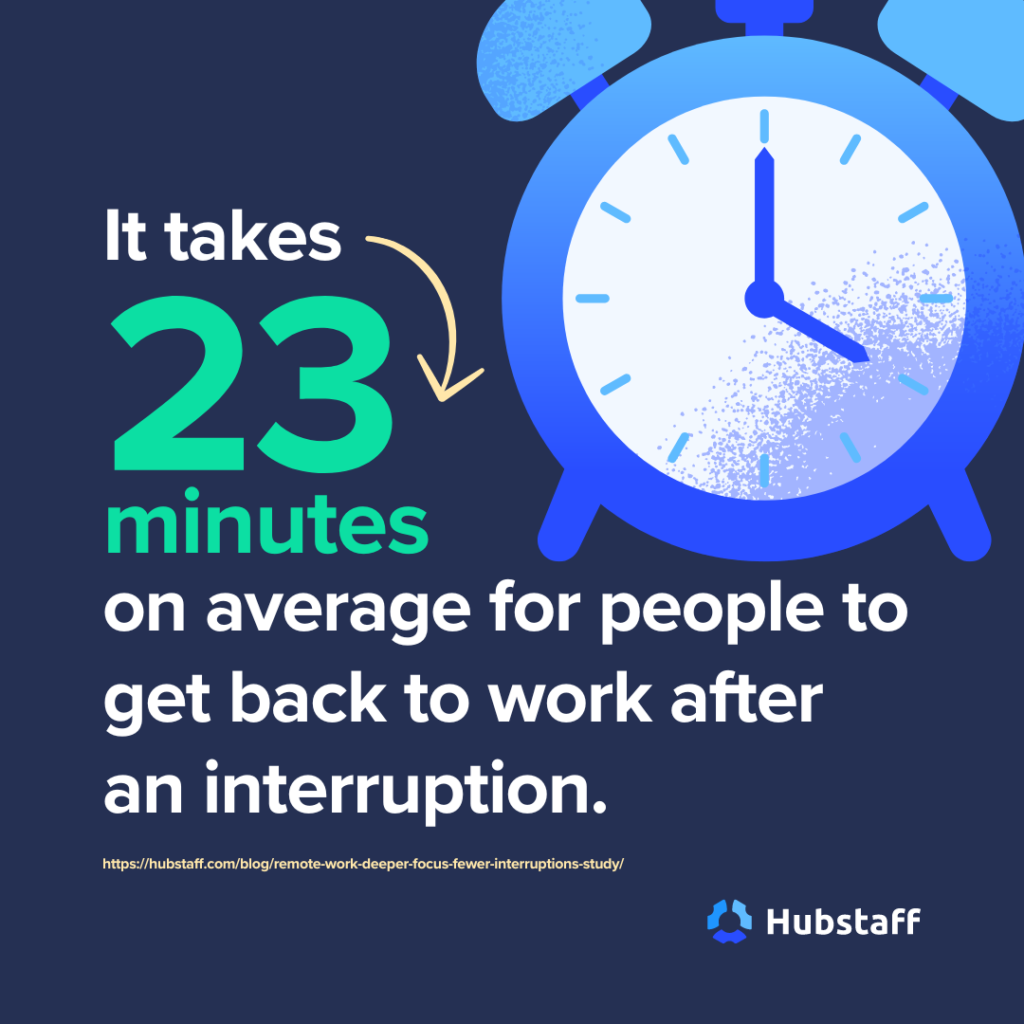In today’s fast-paced, productive workplace, time management isn’t just about being a good employee — it’s also about being kind to yourself. It’s crucial to improve time management skills for both work success and personal well-being.
It feels good to have strong time management skills. Controlling how you spend your time reduces stress and anxiety, according to this study.
Take time management seriously. Read this practical guide on improving time management skills to transform your work. You’ll never look back.
Boost your team’s efficiency with Hubstaff's productivity tools
Try it free for 14 daysWhat is time management?
Time management is about being mindful of how you spend your time.
Mastering time management will allow you to manage your time effectively and productively, especially at work. It’s a real game-changer.
Time management skills enable you to enhance productivity by completing more tasks in less time and reducing stress. Strengthening your time management skills not only boosts your confidence but also elevates the quality of your work.
Benefits of good time management skills
Recognizing the importance of time management is easy once you get started. Time management skills positively impact your work and personal life.
Good time management skills:
- Increase overall productivity at work.
- Help you build more confidence in yourself and your ability.
- Cultivate greater self-discipline in your daily routines and tasks.
- Get things done on your to-do list.
- Maintain a healthy work-life balance.
- Promote and enhance mental health.
- Build trust with your co-workers.
Techniques for improving time management skills in the workplace
We commonly gauge productivity by the output achieved within a specific timeframe.
If you view time as a valuable resource, monitoring how you allocate it is crucial. This practice can provide insights into potential time losses and help you optimize your efficiency.
Simplify your time monitoring with tools like Hubstaff, a time tracking tool that goes beyond just tracking. It provides additional productivity metrics, empowering you to continually enhance your time management skills.
Set clear goals and stick to them
Begin with clarity.
Ask yourself what your objectives are. Establish clear OKRs (Objectives and Key Results). Avoid aimless task completion; instead, define your goals.
Craft specific, measurable, achievable, relevant, and time-bound (SMART) objectives. These are your compass for decision-making. Ensure that all your efforts align with these goals.
When tackling complex objectives, break them into smaller, manageable tasks. Strive for ambitious yet attainable goals to set yourself up for success.
Prioritize crucial tasks to produce higher-quality work
Are you familiar with the Eisenhower Matrix? It’s an excellent time management tool to prioritize tasks based on urgency and importance, enabling you to concentrate on activities that contribute the most value and align with your goals.
Access the matrix by downloading it here and attaching it to your wall for a visual reminder.

Changing priorities as you go is perfectly fine. The key to success is having clearly defined priorities in the first place.
Other methods to help you set priorities and improve your time management include:
- ABC method: Simply prioritize tasks as A (high), B, or C (low).
- MoSCoW method: Classifying tasks into Must-haves, Should-haves, Could-haves, and Won’t-haves.
- Time blocking: Enhance focus by dedicating time slots for different tasks.
- Eat the Frog: Technique: Tackle the most crucial task first for increased daily productivity. I love this method; it works well for me.
- The 2-minute rule: Complete tasks taking less than two minutes immediately.
Set realistic deadlines for successful task completion
Be kind to yourself. Set achievable deadlines by leveraging a time tracking app to understand your task completion time to improve time management.
Remember, you’re not a robot; allow room for thinking, breathing, and breaks. Unrealistic deadlines hinder progress, causing stress and wasting energy.
Prioritize completing tasks effectively over rushing through them.
Shape your day and plan wisely
Take your time management plan to the next level by taking charge of your time and allocating specific time for tasks on your calendar.
Don’t just think about tomorrow. Proactively organize your whole week or even month to optimize productivity and efficiency.
Ensure you regularly review and adjust your time management schedule to incorporate flexibility while consistently maintaining a proactive approach toward achieving your goals.
Complete critical tasks when you’re most productive
Do you know when you are most productive?
Understanding this is essential to figuring out how to improve your time management. You should be doing your most critical tasks during your most productive hours.
Fiverr’s research reveals that 41% of U.S. workers claim peak productivity occurs outside traditional 9-5 work hours.
If you are lucky enough to work for a flexible business (like me), you can boost productivity by customizing when and where you work. Forward-thinking organizations should prioritize skills and results rather than working hours and location.
Use time management tools to uncover insights

A time management tool like Hubstaff is a powerful solution to tackle the primary time management challenge, efficiently tracking your time and extracting valuable insights from the data. Our suite empowers you to make informed decisions and optimize your productivity effectively.
Here’s how Hubstaff can help:
- Firstly, you don’t have to manually take note of your time on tasks and projects. With one click, Hubstaff does this automatically.
- You can set work hour goals for yourself and your team to ensure a balanced workload, promoting efficiency.
- Access over 20 detailed reports, providing deep insights into your work habits and the time it takes to complete tasks and projects.
- Compare your performance against industry benchmarks, identifying areas for improvement in your time management skills.
- Simplify performance analysis with the Highlights widget, effortlessly spotting fluctuations in work time, activity, and more.
- Reduce unnecessary meetings by identifying patterns through real-time updates.
- Distinguish between focused and distracted work, enabling you to address poor time management.
Master the art of saying ‘no’ to protect your time
Efficient time management hinges on politely declining tasks misaligned with priorities.
As mentioned above, establish clear priorities to guide decisions on when to say “no.” This action safeguards your time, enhances focus, and improves overall time management effectiveness in a concise, actionable manner.
Here are things to consider when responding to requests:
- Politely decline tasks that diverge from your goals or projects, setting boundaries for optimal productivity.
- Acknowledge daily energy limits. Strategically say no to prevent subpar work and share your time concerns.
- Leverage your strengths by focusing on important tasks on your to-do list that align with your expertise.
Share the load, delegate tasks
You can optimize productivity by mastering efficient delegation.
If you’re in a managerial role, empower your team by assigning tasks on your to-do list that align with their skills. This effort frees up your time for essential tasks that demand your expertise.
Effective task delegation is central to proficient time management and should be part of your ongoing process.
Learn the art of delegation to enhance your time management skills significantly. Entrusting various tasks to your team based on their abilities frees up your time and fosters the team’s sense of value and motivation. That directly increases team productivity.
By delegating or outsourcing when feasible, you reserve time for tackling more important tasks, propelling yourself toward peak efficiency.
Don’t get distracted; maintain focus

According to a study from the University of California at Irvine, the average time it takes most people to regain focus after an interruption is approximately 23 minutes. This highlights the importance of minimizing interruptions to enhance overall productivity and efficiency in your work.
Identify and minimize distractions by using tools such as website blockers during focused work sessions to enhance productivity and eliminate interruptions.
There are also considerable advantages to remote work for focused time management, as emphasized by insights from Hubstaff data.
Remote team members spend 273 minutes on focused work daily, compared to 223 minutes for in-office employees. Remote teams also experience fewer interruptions (2.78 per day) than office staff (3.40). This difference translates to a potential gain of 4.15 more hours of focused work per week, a 22% advantage.
Embracing remote work enhances focus and presents an opportunity for businesses to save over $1,200 per worker annually, reinforcing the value of uninterrupted productivity.
Reflect on your progress for continuous improvement
Continuously assess your time management skills and productivity, adapting your approaches to optimize efficiency based on successful or unsuccessful strategies.
Hubstaff Insights offers rapid and effective support in only a few seconds, streamlining the reflection process. Save time on reporting and invest more in analyzing the real-time data it provides.
Make informed adjustments to your work strategies, identifying patterns of productivity and inefficiency. Utilize the Highlights widget to identify trends in your performance.
Transform insights into actionable strategies, continuously improving your work habits and overall performance.
Nurture a healthy work-life balance for your wellbeing
According to one study, happiness can boost your productivity by 13%. Don’t drive yourself into the ground; be kind to yourself. Practice self-love and give yourself downtime and breaks to increase and sustain productivity.
A healthy between work and personal life is essential for long-term efficiency.
Workaholics, defined as individuals who consistently overwork, are 60% more likely to experience depression and anxiety. Avoid falling into this category for your own well-being.
Be kind to yourself and watch your productivity soar
In the fast-paced world of work, mastering time management is not just about being an efficient employee; it’s an act of kindness to yourself. Strong time management skills reduce stress and anxiety, positively impacting your well-being, as indicated by studies.
Embrace this essential skill, as outlined in our practical guide, and transform how you work. Recognize the benefits, including increased productivity, confidence, and a healthier work-life balance.
Utilize techniques like goal setting, prioritization, and realistic deadlines. Leverage tools like Hubstaff for insightful time management and to master the art of saying no and efficient delegation. Embrace remote work for enhanced focus and uninterrupted productivity. Continuously reflect on your progress, making informed adjustments for continuous improvement.
Remember, happiness boosts productivity, so be kind to yourself and maintain a healthy work-life balance.
Most popular
How to Calculate a Raise: Practical Guide for Employers
By 2030, the US alone will lose $430 billion annually due to low talent retention — and a lot of this turnover stems from low pa...
How to Survive and Thrive in an 80-Hour Work Week
It’s hard to believe that only a century ago, the 80-hour work week was the norm in the United States. Then, in 1926, the Ford M...
Mastering Workforce Scheduling: Techniques and Tools for Success
Imagine a workday where scheduling your workforce effectively ensures that every shift is perfectly aligned with your business nee...
Top Time Trackers for Virtual Assistants: Enhance Efficiency and Accountability
Virtual assistants (VAs) have a lot of responsibilities — and so do the people who hire them. With so much to keep track of, a t...




